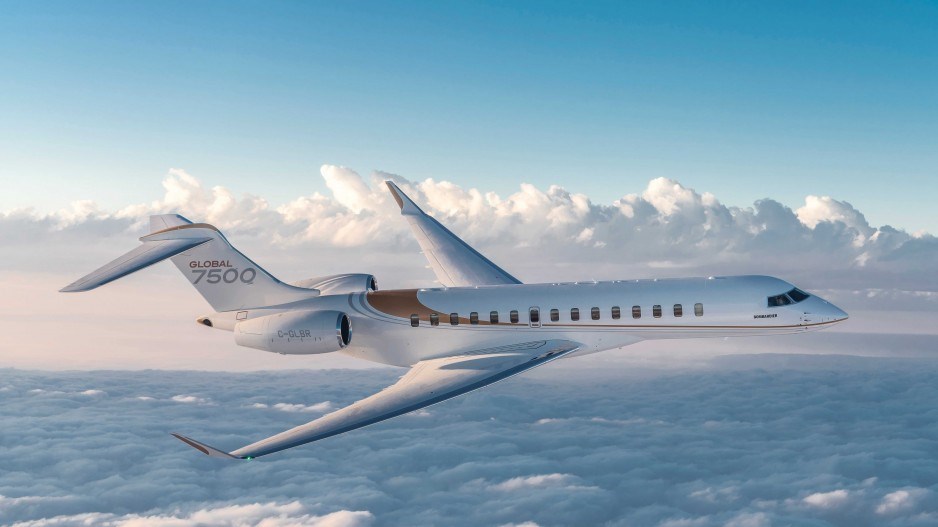Part of BIV’s What big money buys series: Wealthy Vancouverites are lavishing untold amounts of money on big-ticket indulgences, driving a bonanza for the region’s dealers in luxury furnishings, vehicles, yachts and other top-tier toys.
How cool would this be? You have an American client who happens to be in Calgary and you invite him to Vancouver for lunch.
“I’ll send my jet,” you say.
No need to mention that you don’t own the whole thing – just a piece of it.
For many Canadian companies and high-net-worth individuals, fractional ownership of private jets has become a popular alternative to owning one outright.
It’s called fractional ownership because, as with a time-share arrangement, you own a percentage of the jet. But it’s also a fraction of the cost of owning one outright.
Whereas a nine-passenger Embraer Legacy 450 will set you back US$17.7 million – plus about $1 million a year in fixed costs – the same jet under fractional ownership with AirSprint Private Aviation costs $550,000, and annual fixed costs of about $90,000.
For that you get access to 25 hours of flight time per year. If you need more than that, you can increase your ownership share. An average owner typically will buy in at 50 to 100 hours per year, said AirSprint president and COO James Elian.
“You buy part of a specific airplane; however, you have a guaranteed access to the fleet,” Elian said. “You can call us from anywhere in North America, and we’ll pick you up on as little as eight hours’ notice and you only pay when you’re on board.”
AirSprint has a fleet of 15 jets made up of Embraer Legacy 450 and Cessna Citation CJ2 and CJ3 planes, and has a 24-hour concierge service, so owners can order pretty much any kind of food they want for their flights. AirSprint will also arrange to have cars or helicopters waiting at the end of the flight.
“You name it, we can take care of it,” Elian said.
While private planes are a measure of wealth, unlike supercars or yachts, they aren’t just expensive toys, but important business tools.
Geoffrey Carlyle, director of business development in Western Canada for Skyservice Business Aviation, sells private jets. But he calls them time machines because of the hours they save compared with commercial airlines or charters.
“High-net-worth individuals that are successful, they’re very time-starved people,” Carlyle said. “They’re busy. They’re closing business deals here, they’re doing family things there. They’re always on the go.”
For a businessman like B.C. billionaire Jim Pattison, whose companies have more than 600 business locations across Canada, outright ownership of a company jet is an essential business tool.
Pattison owns a Dassault Falcon 900 that seats up to 19 people. It is one of five airplanes owned by the Jim Pattison Group, all of which are used for business.
“The ones that are owned by corporations, they are truly business tools,” Carlyle said. “In 98% of the cases, it’s not the CEO taking off to Palm Springs with his wife.”
It is hard to get a handle on how many private and corporate jets are owned by British Columbians. Carlyle estimates there are 30 to 35 B.C.-owned corporate jets operating out of Vancouver International Airport.
Elian isn’t sure how many of the 150 people who fractionally own jets through AirSprint are from B.C. However, he says, a “significant percentage” of the company’s clients “either live in British Columbia full time or travel to British Columbia frequently for business, or have second homes in British Columbia.”
There are generally four categories of private and commercial aircraft, ranging in price from US$1 million to US$50 million:
•business turboprop (US$1 million to US$7 million);
•light jets (US$1 million to US$9 million);
•mid-sized jets (US$4 million to US$8 million); and
•large-cabin planes (US$5 million to US$30 million).
At the upper end of the scale are Bombardier’s (TSX:BBD.B) Global series of corporate jets – basically the Rolls-Royce of business class planes.
In 2019, Bombardier will roll out its new line of business jets – the Global 5500, 6500 and 7500. The 7500 comes with a US$72.8 million pricetag. The series numbers roughly reflect their ranges – 5,700 and 6,600 nautical miles, respectively.
In addition to the initial outlay for a private jet, hangars, maintenance, crew and fuel cost a typical private jet owner $300,000 to $1 million a year.




